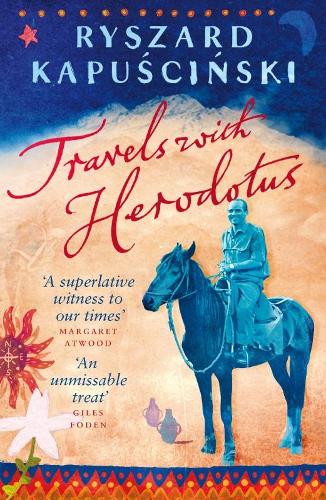
Travels with Herodotus
(Paperback)
Publishing Details
Travels with Herodotus
By (Author) Ryszard Kapuscinski
Penguin Books Ltd
Penguin Books Ltd
4th August 2008
1st May 2008
United Kingdom
Classifications
General
Non Fiction
910.4
Physical Properties
Paperback
288
Width 129mm, Height 198mm, Spine 16mm
214g
Description
'The master of literary reportage ... the man who had been everywhere, seen everything, and survived in the most dangerous places' Independent Travels with Herodotus records how Kapuscinski set out on his first forays - to India, China and Africa - with the great Greek historian constantly in his pocket. He sees Louis Armstrong in Khartoum, visits Dar-es-Salaam, arrives in Algiers in time for a coup when nothing seems to happen (but he sees the Mediterranean for the first time). At every encounter with a new culture, Kapuscinski plunges in, curious and observant, thirsting to understand its history, its thought, its people. And he reads Herodotus so much that he often feels he is embarking on two journeys - the first his assignment as a reporter, the second following Herodotus' expeditions.
Reviews
"Kapucinski fashions an elegant homage to his literary ancestor, whom he helps us to see as the original foreign correspondent . . . Does an excellent job of bringing these ancient stories to life. Educated by the atrocities of his own time, he refuses to let Herodotus's ancient atrocities become distant and abstract . . . Sheds light on his whole achievement as a writer . . . His books continue to live."
-Adam Kirsch, "The New York Sun"
"Kapucinski's rapture is contagious . . . In this dramatic telling by one of modernity's ablest chroniclers, Herodotus stands for democracy, openness, and tolerance. The same can be said of the equally enigmatic, and certain to be missed, author."
-Lawrence Osborne, "Men's Vogue"
"Kapucinski saw more, and more clearly, . . . than nearly any writer one can think to name. Few have written more beautifully of unspeakable things. Few have had his courage, almost none his talent. His books changed the way many of us think about nonfiction . . . A nameless energy gathers as one reads deeper into Travels With Herodotus, and one begins to realize that, in many ways, Kapucinski's previous books, however brilliant, were somewhat impersonal. Here, finally, we experience the early tremors Kapucinski underwent for the privilege to write them. Not all of it is painful; much of it, in fact, is delightful . . . When the last page of this book is turned, note how much smaller and colder the world now seems with Kapucinski gone."
-Tom Bissell, "New York Times Book Review"
"A final gift, a call to wander widely and see deeply."
-Patrick Symmes, "Outside"
"An apt concluding chapter to Kapucinski's corpus, an attempt by a consummate observer toaccount for the route traced by his own life via the great Greek traveler and proto-historian. The two men, separated by 2 millenniums, shared a compulsive, openhearted curiosity . . . Who better to write about a man who could not sit still than a man who could not get still"
-Ben Ehrenreich, "Los Angeles Times Book Review"
"Personally revealing . . . Kapucinski is not often didactic and never triumphalist. His luminous narratives are filled with odd juxtapositions and the ambiguities of real experience . . . Like Herodotus, Ryszard Kapucinski was a reporter, a historian, an adventurer and, truly, an artist."
-Matthew Kaminski, "The Wall Street Journal"
"Extraordinary . . . Punctuated by wonder."
-Elizabeth Speller, "Financial Times"
"From the Hardcover edition."
Author Bio
Ryszard Kapuscinski was born in Poland in 1932. As a foreign correspondent for PAP, the Polish news agency, until 1981 he was an eyewitness to revolutions and civil wars in Africa, Asia and Latin America. His books include The Shadow of the Sun, The Emperor, Shah of Shahs and Another Day of Life, all of which are published by Penguin. He has won dozens of major literary prizes all over the world, and was recently made 'journalist of the century' in Poland. He died in January 2007.
